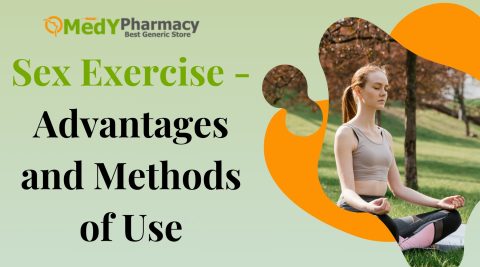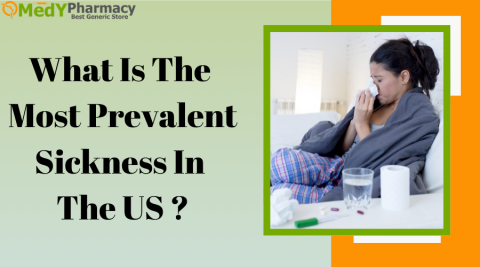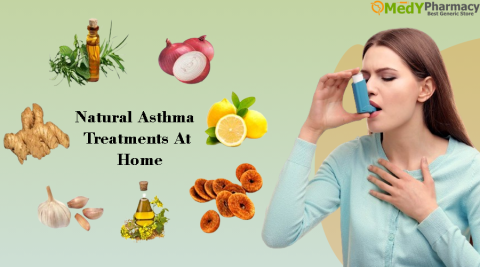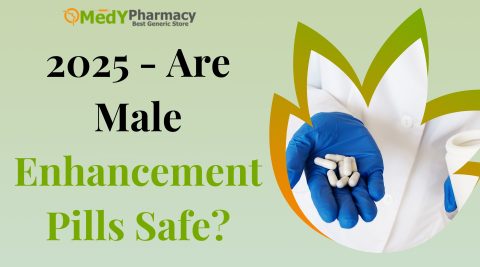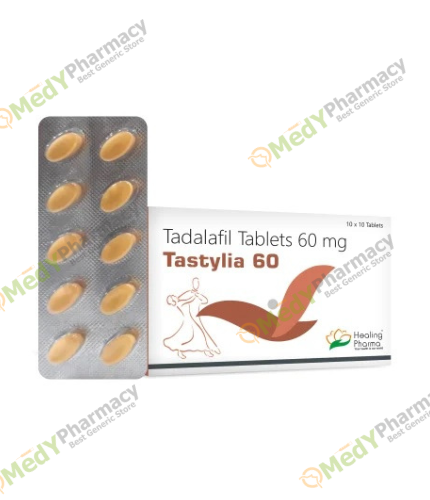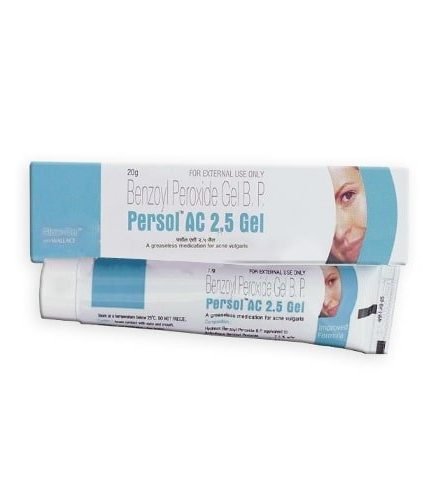Introduction:
To make love to their lover, men require powerful erections. Some men get rapid erections after being stimulated by numerous forms of sexual stimulation, such as caressing their spouse intimately or reading an erotic book.
However, a significant number of men are unable to achieve erections rapidly and are interested in trying methods that would help them achieve erections.
There are several strategies to increase the power of your erections, such as working out, decreasing stress, eating healthily, and cutting back on alcohol and cigarettes.
Furthermore, you may increase the power of your erection by getting more sleep, doing pelvic exercises, and making sure you are aroused.
Given that erections are the result of numerous psychological and physiological processes, it is not surprising that they may occasionally go awry.
If your erections aren’t as hard as they used to be, don’t assume that you will always have unsatisfactory sex. Nowadays, there are several methods to assist in enhancing erectile function. You may increase your erection naturally in a variety of ways, from workouts to lifestyle modifications.
If you’d rather visit a doctor, we’ll go over the best ways to enhance your erections and sex life at home based on the most recent research. We’ll also go over safe and effective medical treatments and drugs. Read on to find out more about how to have a healthy sexual life.
What is a Harder Erection?
The term “harder erection” describes a robust, completely engorged penis that is sufficiently stiff to provide gratifying sexual action.
Arousal causes the penis’s blood arteries to widen, increasing blood flow while limiting outflow. A hard erection results from the accumulation of this pressure inside the erectile tissues.
During sexual activity, both parties tend to find greater satisfaction from a stronger erection. During sexual activity, it enables enhanced confidence, longer-lasting performance, and greater penetration.
The quality of an erection is frequently an indicator of hormonal and cardiovascular health in general. Low testosterone, high blood pressure, diabetes, and other diseases can all be indicated early by weak erections.
Men who frequently have poor erections may experience worry, sadness, or low self-esteem. Harder erections, on the other hand, might increase self-esteem and lessen the stress associated with sexual performance.
Hormone levels, age, stress, lifestyle choices, nutrition, physical fitness, and medical issues can all affect how strong an erection is. Mental health or interpersonal troubles may also be involved.
Lifestyle modifications, like exercising, eating healthier, giving up smoking, and drinking less alcohol, are frequently necessary to improve the quality of an erection. It also helps to have open communication with a spouse and receive mental health care.
A healthcare professional should be seen if you frequently have trouble getting or keeping a firm erection. They can pinpoint any underlying psychological or physiological issues and provide suitable care.
What Causes a Harder Erection?
Significant blood flow to the penis is the main factor for a stronger erection. More blood might enter the erectile tissues when blood arteries enlarge during arousal. The veins that typically transport blood are constricted, which causes stiffness and traps blood inside.
It is vital to have a healthy cardiovascular system. Any condition that promotes heart health, such as exercise, a healthy diet, and quitting smoking, also helps to enhance the quality of erections since strong erections depend on healthy circulation.
An important factor in erection strength and sex drive is testosterone. Stronger, more durable erections are supported by balanced hormone levels, but low testosterone might result in weaker erections.
The brain is the first site of sexual arousal. This communication is guaranteed to function correctly in a healthy neurological system.
Erectile strength and arousal are enhanced by self-assurance, less stress, and a favourable emotional state. A firm erection requires a brain-body link that might be disrupted by anxiety, despair, or relationship issues.
A balanced diet, regular exercise, getting enough sleep, abstaining from smoking, and limiting alcohol use all boost your blood vessels, hormones, and mental well-being, which in turn improves the quality of your erection.
How Does Getting a Harder Erection Help You?
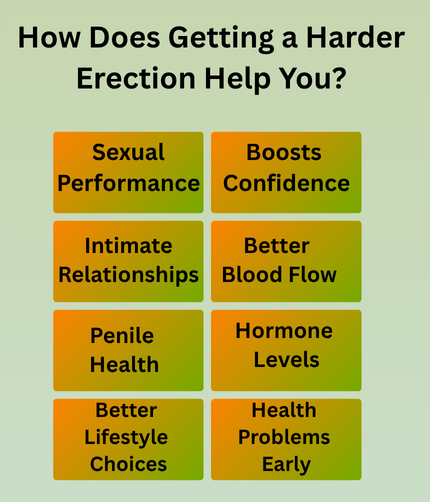
- Sexual Performance
How well a person performs sexual activity is referred to as their sexual performance. This encompasses elements such as arousal, endurance, erection quality, contentment, and the capacity to win over a partner. It is affected by both mental and physical factors.
A healthy body is necessary for good sexual performance. Factors include blood flow, hormones, vitality, and stamina. Obesity, diabetes, and heart disease can all have a detrimental effect on performance.
Satisfaction and performance are enhanced by open communication. By discussing preferences, limits, and desires, both parties may feel more at ease and trust each other, which enhances the experience.
Speaking with a physician or therapist is crucial if problems with sexual performance continue. Medication, therapy, or lifestyle modifications may be used to address underlying psychological or physical issues.
- Boosts Confidence
Your self-confidence encompasses your perception of your physical, emotional, and social capabilities. It denotes having a partner with whom one feels at ease, competent, and confident in sexual settings.
The influence of confidence on sexual performance is direct. When you have confidence in yourself, you’re less likely to hesitate or feel anxious, which keeps you calm and concentrated during intimate moments.
Men frequently feel more confident after achieving and sustaining a stronger erection. It eases performance-related stress by assuring them of their physical well-being and capacity to please their spouse.
A partner’s communication and connection are enhanced by confidence. Confident people express their desires more freely, which may result in more fulfilling and personal partnerships.
- Intimate Relationships
Deep emotional ties, intimacy, trust, and affection are all components of intimate partnerships. They encompass more than just physical attraction; they also involve understanding, support, and common experiences.
With your spouse, emotional intimacy entails feeling open and secure. It requires trust, openness, and sincere communication. This foundation aids couples in overcoming obstacles and strengthening their bond.
Sexual activity, touch, and tenderness are essential components of physical intimacy. These experiences deepen ties, boost enjoyment, and reaffirm connection. Respect and permission from both parties are also essential for a healthy sexual connection.
The foundation of a strong personal relationship is open and honest communication. Listening to one another, talking about needs, and sharing feelings all enhance comprehension and lessen conflict.
- Better Blood Flow
The term “blood flow” describes how well your blood moves throughout your body, supplying your organs and tissues with nutrition and oxygen. For general function, energy production, and healing, healthy circulation is necessary.
Heart health, cognitive function, muscular recovery, and immunological response are all supported by increased blood flow. Additionally, it helps maintain good skin and a balanced body temperature.
Better blood flow is directly associated with firmer, more powerful erections in males. Blood filling the erectile tissues is necessary for erections; therefore, improved circulation boosts endurance and performance. It increases sensitivity and arousal in women.
Frequent cardiovascular exercises that increase circulation include swimming, jogging, and walking. In addition to supporting healthy blood vessels, a diet high in fruits, leafy greens, and omega-3 fats is beneficial.
- Penile Health
The term “penile health” describes the state and appropriate operation of the penis, encompassing its look, sensitivity, erection-achieving capacity, and general cleanliness. Reproduction, overall health, and sexual performance all depend on having a healthy penis.
Early indicators of underlying conditions like diabetes or heart disease may include erectile dysfunction or decreased sensitivity.
Maintaining penile health requires responsible sexual behaviour, such as using condoms and being screened for STIs regularly. If treatment is not received, sexually transmitted diseases can result in discomfort, discharge, sores, and long-term problems.
If you have discomfort, lumps, changes in form or colour, difficulty urinating, or persistent erectile dysfunction, you should speak with a healthcare professional. It is possible to safeguard your general health and sexual health by identifying and treating issues early.
- Hormone Levels
Your blood’s concentration of different hormones is referred to as your hormone level.
The main hormone affecting men’s muscular mass, libido, and erectile function is testosterone. Women’s sexual desire and reproductive health are significantly influenced by oestrogen and progesterone. A healthy sexual function depends on hormone balance.
See a healthcare professional if you suffer from enduring symptoms such as mood swings, exhaustion, or decreased libido. In addition to recommending therapies like hormone replacement therapy or lifestyle modifications, they can evaluate your hormone levels.
- Better Lifestyle Choices
Healthy behaviours that support mental, emotional, and physical well-being are part of a better lifestyle. These include avoiding bad habits like smoking and binge drinking, managing stress, getting adequate sleep, eating healthily, and being active.
Stamina, circulation, and cardiovascular health are all enhanced by regular exercise. Exercise also helps maintain a healthy weight and improves mood by generating endorphins, both of which are linked to increased vitality and improved sexual performance.
Relationships and your body might suffer from long-term stress and poor mental health. Your emotional resilience, sleep quality, and anxiety levels can all be improved by engaging in mindfulness, meditation, or therapy.
- Health Problems Early
Early detection of health issues increases treatment success and can help avoid consequences. Early diagnosis makes managing several disorders simpler, including diabetes, hormone abnormalities, and heart disease.
Early warning signs of more serious health problems may include changes in sexual function, such as discomfort, decreased desire, or trouble achieving or sustaining erections. Frequently, these symptoms come on before other, more overt indications.
Hormonal imbalances, diabetes, high blood pressure, and cardiovascular disease are among the health issues associated with sexual difficulties. Blood flow, nerve function, and hormone balance—all essential for sexual health—are impacted by these disorders.
Symptoms such as mood swings, frequent urination, exhaustion, and unexpected weight changes might indicate underlying health issues in addition to sexual changes. By observing these symptoms, an urgent medical examination can be achieved.
How to Obtain Erections That Are Harder Over Time
Consuming foods high in nutrients promotes hormone balance and the health of your vascular system. Eat a lot of fruits, veggies, lean meats, whole grains, and nuts. Antioxidant-rich foods, like leafy greens and berries, can enhance blood vessel health and reduce inflammation, both of which can increase the strength of an erection.
Kegel exercises focus on the erection-supporting muscles. Regular practice of these can improve control and stiffness of the penis during intercourse. Over time, firmer, longer-lasting erections are a result of stronger pelvic muscles.
The impulses in the brain required for arousal are disrupted by stress and anxiety. Mental block reduction can be achieved by practices like mindfulness, meditation, or therapy. A focused, peaceful mind promotes a better sexual response and, over time, can enhance the quality of an erection.
Limit or give up smoking, cut back on drinking, and stay away from recreational drugs. Erections are weakened by these drugs because they narrow blood vessels or interfere with nervous system activity. Healthy blood flow and nerve sensitivity are progressively restored by eliminating these variables.
Consult a physician if altering one’s lifestyle is insufficient. They might look for underlying conditions such as pharmaceutical side effects, cardiovascular disorders, or hormone abnormalities. To develop firmer erections, procedures such as hormone therapy or prescription drugs may occasionally be required.
How to Quickly Get Hard
Physical contact is vital, but so is mental arousal. Your brain’s arousal regions can be activated, and the erection process accelerated by fantasising, watching captivating content, or having sexy conversations.
In erogenous zones, touching or being touched promotes blood flow to the penis. Building anticipation and accelerating your hardness may be achieved with gentle foreplay that targets parts such as the inner thighs, neck, and ears.
Make an effort to de-stress and prioritise enjoyment above performance. Taking deep breaths or focusing on your current feelings will help you stay present and become hard more quickly.
Perform a few short exercises to raise your heart rate and circulation, such as deep squats or jumping jacks.
Erections can be slowed down and nerve response dulled by even small doses of alcohol. Smoking causes blood flow restrictions. Being sober can help you stay sober for longer and get hard more quickly.
L-arginine, ginseng, and maca root are examples of natural supplements that may help increase blood flow and arousal.
Why Is It Harder to Get an Erection?
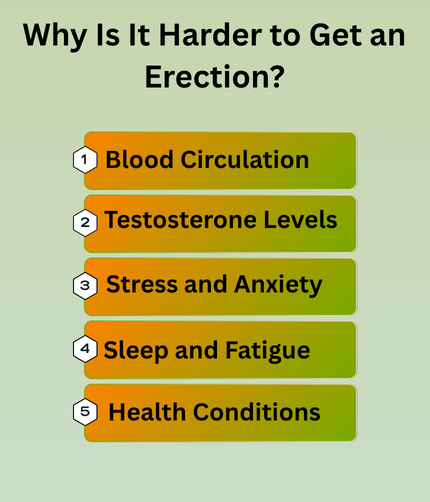
- Blood Circulation
A good circulation of blood is necessary for a powerful erection. The penis fills with blood while you’re excited, which makes the erectile tissues rigid.
Blood flow can be impeded by conditions such as heart disease, blocked arteries, and high blood pressure. Erections may be weaker, shorter, or not occur at all if there is reduced blood flow to the penis.
Since erectile dysfunction can occasionally manifest before other heart disease symptoms, it’s a warning indicator that should be taken carefully.
A heart-healthy diet high in berries, leafy vegetables, and omega-3 fats also keeps your blood vessels healthy and clean.
- Testosterone Levels
The main hormone involved in male sex is testosterone. The biochemical mechanisms that aid in achieving and sustaining an erection are also supported by it.
Although blood flow is primarily responsible for erections, testosterone stimulates arousal and desire. Low levels might result in weaker erections, decreased desire, and decreased overall sexual pleasure.
However, prolonged stress, obesity, sleep deprivation, certain drugs, and medical disorders, including diabetes or low pituitary function, can also result in low levels.
Low testosterone could have a role if these are combined with weaker erections.
A diet high in zinc, good fats, and vitamin D, regular exercise (particularly strength training), adequate sleep, and stress reduction are all ways to promote healthy testosterone. A healthy weight and abstaining from excessive alcohol use are also beneficial.
- Stress and Anxiety
In the brain, erections start. Mental and emotional signals are the first steps in sexual arousal, and they set off a series of events in the neurological system. Instead of permitting relaxation and arousal, stress and anxiety disrupt this process by triggering the body’s “fight or flight” response.
Even in the absence of a medical problem, it may be more difficult to get or maintain an erection due to pressure to perform, previous bad experiences, or fear of not pleasing a partner.
Shallow breathing, tense muscles, a fast heartbeat, and attention are all symptoms of anxiety that can disrupt blood flow and sexual desire. The condition gets worse as a result of the feedback loop created by these bodily symptoms.
- Sleep and Fatigue
For testosterone production to be healthy, sleep is necessary. Particularly in the early morning hours, profound sleep is when the majority of testosterone is produced. Lowered testosterone levels from sleep deprivation might impair sex drive and erection strength.
Insufficient sleep increases the stress hormone cortisol, which can inhibit testosterone and decrease blood flow, two essential factors for achieving and sustaining an erection. Persistent sleep deprivation leads to a hormonal imbalance that affects sexual performance directly.
Your arousal may be dulled and your reactivity to sexual stimuli reduced when you are tired. Your body could react differently than you anticipate, even if you want to have sex.
7 to 9 hours of good sleep should be your goal each night. Establish a regular sleep routine, stay away from devices before bed, cut back on alcohol and caffeine in the evening, and establish a peaceful, dark, and cool sleeping space.
You might think about consulting a physician or sleep expert if you often have weariness and weak erections, wake up exhausted, or snore excessively. Addressing sleep problems may greatly enhance sexual health, increase energy, and restore hormone balance.
- Health Conditions
Blood flow to the penis is decreased by heart issues such as high blood pressure, excessive cholesterol, and blocked arteries. Weaker or less frequent erections are frequently caused by poor circulation.
Over time, blood vessels and neurones may sustain damage from both type 1 and type 2 diabetes.
Disorders, including Parkinson’s illness, multiple sclerosis, and hypogonadism, or insufficient testosterone, impact the hormones and nerve impulses necessary for erections. Additionally, pituitary and thyroid disorders can interfere with sexual function.
It’s critical to get any underlying medical conditions examined if you’re experiencing persistent erection difficulties. Restoring normal sexual function and improving your general health may frequently be achieved by treating the underlying reason, whether it be hormones, blood pressure, or blood sugar.
Can an Erection Be Obtained with Medication?
PDE5 inhibitors are the name of these medications, which increase blood flow by relaxing blood vessels. Viagra and Levitra only last 4–6 hours, whereas Cialis lasts up to 36 hours. To work, all need a certain amount of sexual desire.
For the majority of men with mild to moderate erectile dysfunction, these drugs are helpful. They are not, however, safe for everyone, particularly for people with certain cardiac diseases or those taking nitrates for chest discomfort. Consult a physician beforehand.
Headaches, flushing, nasal congestion, lightheadedness, or indigestion are among the moderate side effects that are typically experienced. Serious adverse effects, such as visual problems or persistent erections (priapism), are uncommon but might happen and need to be treated right away.
Penile injections, vacuum erection devices, urethral suppositories, or surgically implanted penile prostheses are alternative therapies if oral medications are ineffective or not an option. Finding the appropriate course of action can be aided by a urologist.
The symptoms, not the cause, are treated with ED medications. Even if medications only temporarily alleviate your erectile dysfunction, treating the underlying cause, such as diabetes, stress, or low testosterone, is crucial for long-term recovery.
How Long Is The Typical Male Able To Remain Erect?
The duration of erections varies greatly. Higher testosterone levels and improved cardiovascular health in younger men frequently result in longer-lasting erections. The duration of an erection can be shortened by fatigue, anxiety, alcohol, drugs, and medical issues.
Some men can remain erect for 20 to 30 minutes or longer using delayed ejaculation or edging techniques, particularly if stimulation is interrupted and then resumed. Following an orgasm or the cessation of stimulation, others may become less stiff.
A nocturnal erection, lasting 20 to 40 minutes during REM sleep, is a normal occurrence for men. Although they have nothing to do with sex, they do represent normal nerve and blood flow.
Men go through a phase known as refractory ejaculation, during which achieving another erection is either impossible or extremely difficult. This may take a few minutes to many hours, depending on health and age.
Erections that are frequently too short or prevent fulfilling sex might indicate erectile dysfunction. Conversely, priapism, a medical issue that has to be treated right away, may be the cause of an erection that lasts longer than four hours.
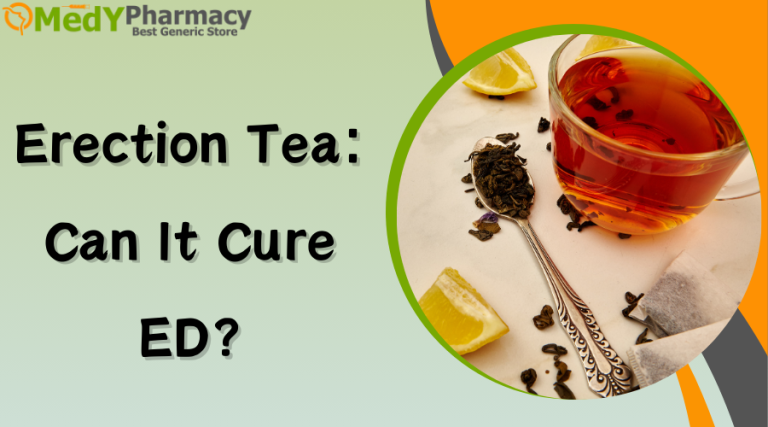
Developing and Maintaining an Erection
In the brain, erections start. Visual stimulation, fantasies, or sexual ideas cause the neurological system to communicate with the penis. Stress reduction and an emphasis on enjoyable ideas or feelings might assist in increasing arousal and facilitating becoming erect.
Blood flow and sensitivity are increased by touch and foreplay. The body’s arousal reaction is triggered by investigating erogenous areas such as the neck, genitalia, and inner thighs. Building a powerful erection requires regular, enjoyable stimulation.
Consuming heart-healthy foods, such as berries, leafy greens, and good fats, can also help erections get stronger and last longer.
Mid-activity erection loss might be caused by performance anxiety and overthinking. To stay in the moment, try mindfulness exercises, deep breathing, or simply concentrating on your partner and the experience rather than the “performance.”
Seek advice from a healthcare professional if you frequently struggle to achieve or sustain an erection. Hormonal imbalances or other health issues may be indicated by erectile dysfunction. Medical gadgets, lifestyle modifications, medicine, and therapy are all possible forms of treatment.
Take it slow, pause, and examine your partner’s physique. This helps you keep hardness for longer by creating suspense and allowing your arousal to climax gradually.
Following even one of the aforementioned tips will result in better erections and a lot more sexually fulfilling sex life.
Almost all men watch porn at some point in their lives to learn about sexual relations or simply to obtain arousal for their enjoyment.
However, problems arise when it takes precedence over all other sources of sexual knowledge. Go to our Medypharmacy website.








